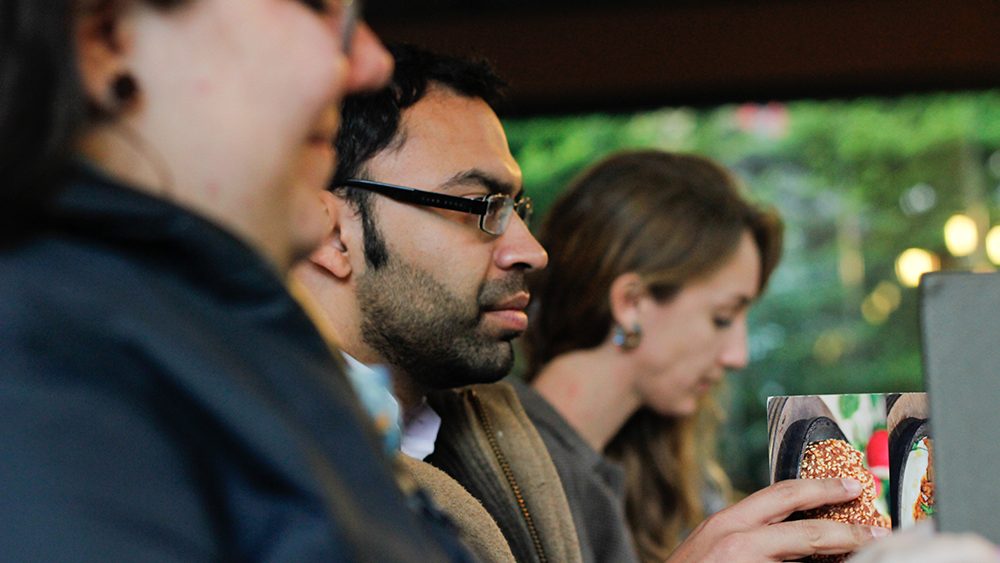Today, we’re thrilled to share the final installment of Hassan Ahmad’s reflections on the IRAP student trip to Beirut, Lebanon. If you’ve missed any of his previous three blog posts, check out our archives. And don’t forget to share with your networks!
As I leave Beirut, I attempt to concentrate my thoughts despite the myriad of emotions resulting from a few days of meeting displaced Syrian families seeking resettlement. The Syrians I came across this week were all families, some with two children, some with three, some with more. It’s their faces I won’t soon forget. To me at least, they all exude the same combination of loss, hope, and confusion. Loss of a relatively comfortable life couched with a one-time sense of stability; hope that they will either find safe haven in some developed western country or, in the least, find funding in Lebanon for medical treatment required by them or their children; and confusion as to the steps to be taken in the resettlement process.
My story is a little different than my IRAP colleagues. For one thing, I’m Canadian. Also, I’m completing my LLM (Masters of Law) at Berkeley as opposed to a first law degree. Because of this, I’m actually a licensed attorney and practiced law for a few years in Canada before taking a sabbatical for a year to pursue my Masters. Part of my practice involved defending insurance companies pursuant to personal injury claims where insured persons were (allegedly) injured. Involved in any lawsuit was a deposition where I would question the claimant about the incident at issue and the resulting injuries. It became fairly easy to determine when a claimant was exaggerating or plainly lying in the hopes of getting a big payout. I would remain unphased as the claimant recounted how his or her life had deteriorated following some car accident or slip and fall. The interviews our team conducted this week were no different than those depositions. We would review their personal background, the incidents that led to their fleeing Syria and their life in Lebanon. At the same time, these interviews were a world apart. One can just peruse the words that would come out during our interviews. Never in my depositions did I hear, “bombing, torture, Hezbollah, Mukhabarat, chemical weapons, Shia-Sunni, rape” and others. I never recall depositions where the claimant lost his or her entire home and livelihood or was jailed and tortured for an extensive period of time for expressing discontent with the government. However, in war torn Syria (and to an extent, before the war), these accounts have become relatively commonplace. As opposed to the depositions, these interviews phased me, although not to the extent where I couldn’t objectively assess the viability of a resettlement claim. They phased me because the events behind even the most mild claims are still far worse than any of us could or would ever want to imagine.
Suffice it to say, our group’s short time in Beirut may not make any significant difference in the big picture of resolving the Syrian refugee crisis. However, IRAP’s ongoing refugee work—not just with Syrians—is making a difference. For me and the others who came to Beirut for the week, this is a beginning rather than an end. We will continue the ongoing representation of our Iraqi and Afghan (and increasingly Syrian) clients back in the United States. And whether or not refugee law becomes our predominant practice, for many of us, it will preoccupy part of our time and efforts as attorneys. Given the state of refugees across the globe (estimated to be 60 million worldwide), contributing to alleviating the crisis isn’t really optional—not for me at least.
A teacher I met this week at a school for Syrian refugees told me that just about all her students had seen beheadings or dead bodies strewn on the streets of their Syrian towns. Many of them have family members who were killed during the ongoing fighting. Throughout this week, I saw up close what we had all been witnessing through our TV sets and Internet feeds. The struggle these refugees and those remaining in Syria face is real. The future may even be bleaker. Children who grow up in war torn regions have shown a proclivity to violence in their adult lives. They act out and many times are unable to become productive members of society. As an American poet penned after the bombing of Pearl Harbor in 1941, “I and the world know what all school children learn—those to whom evil is done will do evil in return.” Fortunately, schools run by organizations such as Jusoor and Yalla are providing the stability so desperately needed by refugee children as they begin their new lives in a different country.
My first post talked about our collective debt to Syrian refugees. The reality is that whatever efforts are put forth in resolving the refugee crisis and ending the civil war in Syria, they won’t erase the destruction that has already occurred. The future can’t erase the past. But with our collective efforts, from organizations such as IRAP, Helem, and others, from national governments and international bodies as well as from ordinary individuals, displaced Syrians can reclaim the lives stolen from them by a war they have nothing to do with. As with all history, whether personal or political, it’s not so much the events that count, it’s the response to those events. Let us stand up and respond!




Comments are closed.